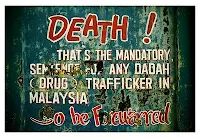The Federal Court has confirmed the conviction and death sentence meted out to an Indian national for trafficking in 20.6kg of ketamine four years ago.
A 5-man bench, led by Tan Sri Richard Malanjum, said it was safe to sustain the conviction of the lower courts despite uncertainty whether a bag that contained the drug was locked.
"However, reviewing the evidence in totality, the appellant had knowledge of the drug."
He said the defence had failed to create a reasonable doubt in the prosecution's case.
In January 2010, the Shah Alam High Court had found driver S. Athiseshan guilty of trafficking in the drug at the Kuala Lumpur International Airport in Sepang.
The offence was committed at 3pm on July 26, 2008. The Court of Appeal upheld the conviction in August last year.
At the Federal Court yesterday, court-assigned lawyer S. Ravichandran argued that the prosecution had failed to adduce evidence that the bag was locked.
However, deputy public prosecutor Nurulhuda Nooraini Mohd Noor submitted that Athiseshan had opened the lock with a key that was kept in a side pocket of the bag.
She said the trial judge at the High Court was correct to conclude that the appellant had knowledge, custody and control of the drug.
According to the facts, Athiseshan had boarded a flight from New Delhi, which stopped in Singapore before landing at KLIA.
Customs officers manning the scanning machine discovered the drug in Athiseshan's bag, but he claimed that his bag contained designer saree, and someone had switched it.
In another case, the same bench also dismissed an appeal by an unemployed man for trafficking in 7kg of ganja 6 years ago.
Mohd Fauzi Abdul Rahman, 47, committed the offence in a house in Kampung Melayu Majideee, Johor Baru, on Oct 30, 2006.
The High Court sentenced Fauzi to death in August 2009 and the Court of Appeal upheld the conviction last year.
Deputy public prosecutor Tengku Amir Zaki Tengku Abdul Rahman submitted yesterday that Fauzi led police to discover the drug and this should be seen as a subsequent conduct under the Evidence Act.
He said evidence tendered in the High Court showed that Fauzi had rented the house three months before the discovery of the drug, and only he had access to the premises.
Source: New Straits Times, July 31, 2012
